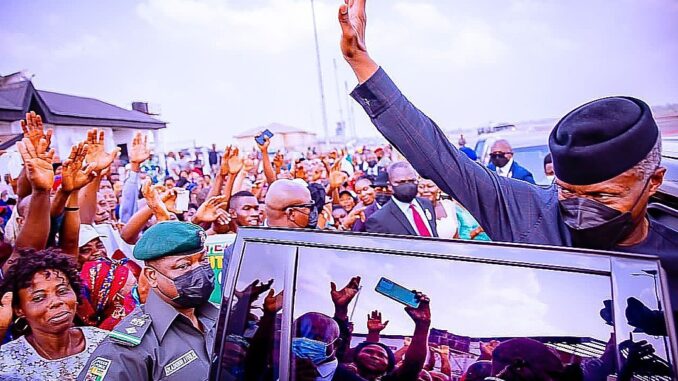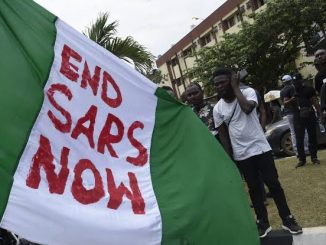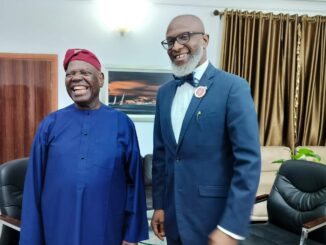
By Seyi Gesinde
A national stage for debates on who succeeds the incumbent, President Muhammadu Buhari, is finally set, counting from Monday, April 11, 2022, the day Vice President Yemi Osinbajo declared his interest to succeed his boss in 2023. There is no denying this fact, this was what millions of Nigerians had waited for — it almost turned many to sceptics, thinking, will he declare, will he not declare his interest? Now he has declared and the race has started.
There are also other Nigerians who have shown interest to be President in 2023, either in his party, the ruling All Progressives Congress (APC), or the opposition People’s Democratic Party (PDP), and the rest. But that is not the concern here, the focus is to state 10 reasons Osinbajo is the best man for the presidential job in 2023 among all aspirants across the board.
The yardstick here are his achievements, pedigree, roles played in his current office, and most especially as the acting President, which is the biggest qualifying factor, being the only candidate who has acted successfully in that power capacity for an appreciable time — qualifying him of being called a ‘tested and trusted’ leader.
Now, it would not have been possible if not for his boss, President Buhari, with whom Osinbajo has a robust relationship, who created that platform for him to showcase his skills and serve creditably. We’ve had their predecessors in this same 4th Republic who fought each other almost all through their two terms of eight years in office. Buhari is a leader, and he is credited and commended for all the achievements recorded under his dispensation.
Osinbajo as Acting President
It is good to note that, Osinbajo is not new to the role he is aspiring to assume fully. He acted in the capacity of an Acting President in June 2016 and July 2017, during the periods the President travelled abroad for medical reasons. Undoubtedly, those times being Nigeria’s challenging seasons had prepared him to run for this Nigeria’s highest office. It was during these occasions his qualities of being a leader who deeply cares about the common man and the progress of Nigeria became more evident, and it has been like that to date. This is the type of leader Nigeria needs.
To now, to dwell on the reasons one after the other:
1. New breed, astute and incorruptible
VP Osinbajo is still relatively young. He celebrated his 65th birthday on March 8, 2022, placing him in between the young and old schools settings. Being seen now as the country’s stabilizer, in their almost seven years in office, he has traversed the geo-political zones of Nigeria and is well accepted across all interests irrespective of their tribes and religions. With the level of his acceptability, he appears to be a friend to all, both the rich and poor, old and young Nigerians. All these make him an ideal candidate for the presidential office.
Yet, he didn’t just start as a VP, he had been a successful public servant all along, being a former Attorney General and Commissioner Justice in Lagos State, at a period he introduced a series of reforms which has made the Lagos judicial system somehow the best in the country. Unarguably, now as the chairman of the National Economic Council (NEC), though a lawyer, his understanding of the nation’s economy is by every inch not in doubt. His record is top-notch, Osinbajo is extremely capable both politically and technocratically to lead Nigeria in 2023, possessing all the qualities and is naturally in the lead ahead of his rivals.
2. Naira, exchange rate stability and economic balance
At that time, the Acting President Osinbajo, presiding over the National Economic Council meeting, issued a directive to the Central Bank of Nigeria (CBN), to review its foreign exchange policy that weakened the national currency, as the apex bank released $500 million to the banks, and this forced dollars to crash, 24 hours after, stabilising the exchange rate at N450 from N525. It was during this period Osinbajo declared open the Agenda for Consultative Forum on Economic Recovery and Growth Plan, where he told the forum that the nation was in a very serious economic situation, but assured that the government remained committed to putting the economy on the path to sustainable growth, which was done.
3. Detribalised
Osinbajo here proved to be a detribalised Nigerian. After a series of controversies on the appointment of a substantive Chief Justice of Nigeria, it was then the Acting President, Osinbajo submitted the name of Justice Walter Onnoghen to the National Assembly for confirmation, and this was even less than 24 hours before the expiration of his three-month acting period. It was this singular act that saved the country from a constitutional crisis, as it was believed that Onnoghen had been sidelined from occupying the office being from the Southern Nigeria, against a botched decision of a “cabal” to reproduce a Northerner in the office. But that Onnoghen was next in line to emerge and that this was stamped by Osinbajo defined his nationalism and positioned him as a leader who is fair and just.
4. Regulation for food prices
During this period there was a hike in the food prices, and to contain this, the Acting President set up a presidential task force to address the skyrocketing prices of foodstuff across the country. He also met with the executive director of the World Food Programme (WFP), Ms Ertharin Cousin. Afterwards, the Presidential Task Force on Food Security was mandated to reduce the prices of food items in the country.
At a particular Federal Executive Council (FEC) meeting, measures were adopted to reduce prices of food items in the country, while the importation from ECOWAS countries, of finished products that could be produced locally, was restricted, in addition to the approval by the FEC, of N21 billion for the construction of the Ilorin-Omu Aran-Kabba Road, Section, which will also ease the transportation of foodstuffs across the country’s north and south.
ALSO READ: Role modelling: Story of Nigerians’ applause for Osinbajo on youth empowerment
5. Problem-solving skills
Osinbajo as the Acting President held face-to-face talks with communities in the creeks of the oil-rich Niger Delta on how to stabilise the region, fix their infrastructure and ensure a hitch-free flow of crude to the international market. The purported neglect of the region, being the country’s economic power base has been the reason the militants put forward as the cause of their restiveness.
The Acting President also made a follow-up visit to Port Harcourt, Rivers State, where he met with stakeholders of the oil-producing communities, and later rolled out the framework for the clean-up exercise of Ogoni land. It settled the whole issue once and for all.
6. Effective security management
As an acting President, Osinbajo proved his mettle as someone qualified for the job. Top among his achievements was his ability to hold the country together peacefully, as he was able to contain the restive insurgents to establish relative peaceful coordination of the national affairs.
7. Strategic economic recovery plans
During his days as the Acting President, Osinbajo presided over the Presidential Business Forum, after which 59 strategies for implementing the Economic Recovery and Growth Plan (ERGP) were unveiled. He launched the Micro, Small and Medium Enterprises Clinics at the Presidential Villa.
Part of the growth strategy was the adoption of a 60-day national action plan for business, in an expanded meeting of the Presidential Enabling Business Council, chaired by Osinbajo as the Acting President, and was attended by the then-Senate President Bukola Saraki, former House of Representatives Speaker Yakubu Dogara and other government officials. It was after the meeting that Osinbajo told the nation to expect changes in business visas, as well as seaports and airports. It has come to pass.
To solidify the plans, he also paid an unscheduled visit to the Murtala Muhammed International Airport, Lagos, where he inspected facilities and interacted with airport officials. But less than 24 hours after his unscheduled visit to Lagos airport, the Federal Government announced the sack of 10 directors of the Nigeria Civil Aviation Authority (NCAA). Three new directors and a general manager were also appointed for the Federal Airports Authority of Nigeria (FAAN), to boost efficiency at the country’s airports.
8. Rule of law and preservation of democratic culture
A firm holder of authority who is prudent can only rule successfully in Nigeria, and Osinbajo had displayed these traits in power when in 2018 as the Acting President, he ordered the sack of the then Director-General of the Department of State Services (DSS), Mr Lawal Musa Daura following the operatives blockade of the National Assembly complex.
Osinbajo, who described the unauthorized takeover of the National Assembly complex as a gross violation of constitutional order, rule of law and all acceptable notions of law and order, did not prolong the matter before approving the removal from office of Daura, considered to be part of the “untouchable” “Cabal” in Aso Rock. It may be controverted, but the decision was in order, as it was taken purely for the national interest.
Masked operatives of the DSS had prevented lawmakers, staff and journalists from entering the National Assembly, and its fallout was the opposition lawmakers accusing l the ruling APC of being behind the blockade which saw the lawmakers locked out of their offices. The clerk of the National Assembly was also refused entry to the Assembly complex.
9. Commitment to Nigerians’ welfare
As an Acting President, Osinbajo successfully combined his duties with various responsibilities assigned to him as the Vice President, such as chairing the National Economic Council (NEC), the National Economic Management Team (NEMT), the government’s think-tank responsible for the formulation of the country’s economic policy direction, saddled with the responsibility of guiding the president on his functions.
Now, for over seven weeks of his active engagement as Acting President, Osinbajo, he navigated the country in the right direction without fear or favour, which his loyalty to his boss, President Buhari, who was out of the country at this period was undeterred. At the same time, Osinbajo’s commitment to Nigerians’ welfare was top notch.
10. Nationalism, equity and fair play
Then, even as a Vice President, Osinbajo, has travelled around the country solving problems, bonding and binding friendships. It is of note to recall in April 2021 when he visited Ebonyi after the communal clash that led to the killing of 22 people in four communities of Ishielu Local Government Area of Ebonyi State, which he described as “sad and unacceptable,” Osinbajo had promised that the Federal Government will ensure justice for the victims of the unfortunate incident in the State.
The same was the situation in Imo State, in April of, same year, where the Vice President visited twice in 48 hours, first after the attack on the police stations and the state’s prison, and the following day was to commission projects.
In Imo, Osinbajo admonished Nigerians to come together and reject the agents of anarchy seeking to cause chaos for their selfish interests, especially as there are many more who are working tirelessly to build up the country’s system and enhance it.
11. National Economic Sustainability Plan
Now, whether as the Acting President or back to his office as the Vice President, Osinbajo through policy formulation had redirected the economy of this country for good, in both capacities. Even, as NEC chairman. Likewise, driving the National Economic Sustainability Plans (ESP) of the Buhari administration, as the Vice President, which has been a lifeline for many hit by the aftermath effects of Covid-19 devastation on the economy, a lot of Nigerians have benefitted from the unprecedented government largesse, while millions of businesses have been brought back to shape.
12. Courage and competence
In all, it has been a success story for Osinbajo, who has shown competence and has proven to be qualified for this exalted and highly coveted office. So, if he is now becoming a recurring decimal in the power game towards who takes over as Nigeria’s President in 2023, it is understood. He is a man of sterling qualities, who is justified if he said in his plans also is to continue the good works they started under the President Buhari-led government.
Now, the party, APC, is throwing its card around if to adopt either the direct or indirect primaries to elect its candidates, Nigerians are waiting. And if it is the third option they are adopting, let Osinbajo emerge as a national consensus presidential candidate — he is the best of all — tested and trusted.
• Gesinde, is a digital marketing expert, and political cum public affairs analyst.




